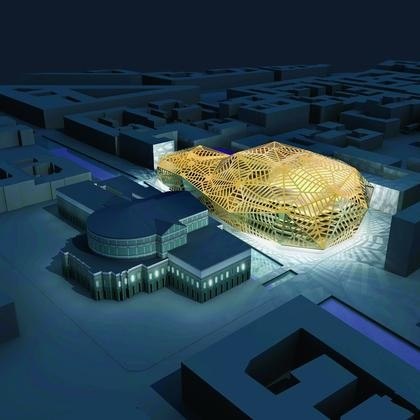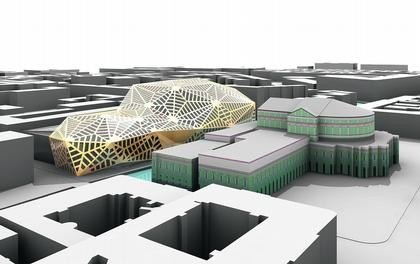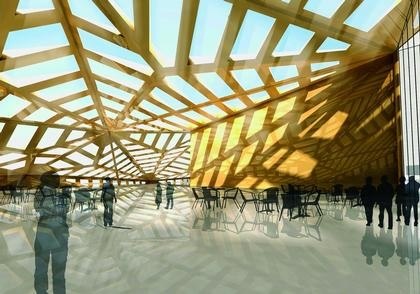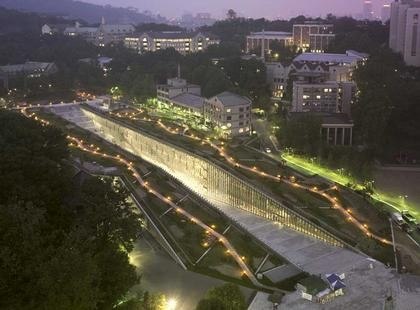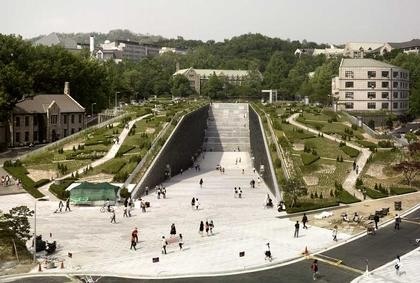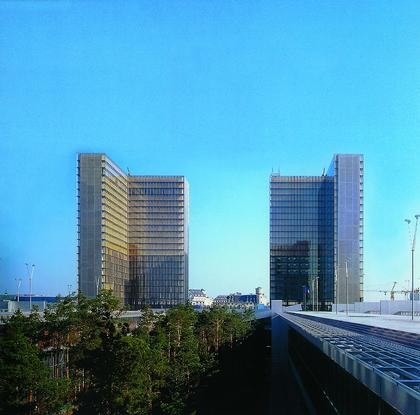|
Dominique Perrault is one of participants of an exposition of Russian pavilion of XI Architectural biennial in Venice
What has been your best and worst experience of working abroad?
My best was in Spain. After the death of Franco, the Spanish acquired an enthusiasm and appetite for development.
They were interested in what they could take from others and use in Spain. The Spanish are very good at tennis; they
have an abundance of champions and magnificent teams, but they don’t have a tennis stadium such as Roland Garros in
Paris or Wimbledon in London. They want to host international tennis competitions and create new champions. Their first tennis tournament will take place in 2009.
That’s your best experience, but what about your worst?
To date, my worst has been in Russia. It turned out that it’s very difficult for a foreign architect working in Russia to get
his work respected. It’s quite possible for people to say to him, “Everything you are proposing here is nonsense. It doesn’t meet the regulations for our country. And since this foreigner hasn’t a clue when it comes to the rules and regulations for our country, let him find his own way out of trouble.”
But aren’t these just the ordinary difficulties of translation?
Problems with comprehension occur everywhere. The question is how to deal with them successfully. My view is that it’s more important to make sure you get the right result rather than fending off an importunate foreigner who keeps on asking for things. If a client hires a foreign architect, this does not mean he’s making his life easier. No. Holding an international competition is in itself a headache. Then the client has to make an effort to host the foreigner. He must draw up a contract, monitor the project, and most importantly of all, help the architect work in a foreign country. The client must support the architect. This makes it more difficult, I think, to work, but then the result promises to be better. Because why else would one take the trouble of hiring a foreigner?
How were you invited to take part in the competition announced in November 2002? Were there talks and negotiations?
They rang each of us up to ask whether we wanted to take part – whether we would be interested in doing so. This is the way it’s always done, so as not to waste time. There were talks, as is the done thing in such cases. To begin with, there was a long list of 30. This was then reduced to 20, I suppose, and then in the final stage there were seven of us left. It all ended with the letter of invitation.
Were you paid for this competition work?
This was part of the rules. The programme set the amount of work to be done, the deadlines, and the compensation to be
paid. We had three months to produce our design proposal. We visited St Petersburg during the winter. It was colder than I’d ever known it. We came back, sat down to work, and sent off our design proposal at the end of May. And at the end of June 2003, during the White Nights, we were back in St Petersburg again waiting for the jury to announce its decision. And we were unbelievably anxious. The thing is, you organized an amazing competition. There had never been anything like it. The main difference was that all the designs were exhibited at the Academy of Arts. This is not the way we do things. Usually, the jury meets to take its decision first and then the general public is invited in. But in this case there were immediately articles in the press and discussions in blogs. And yet at that stage we hadn’t even spoken about or explained
our projects. And given that we all know each other, we would ring each other up to compare notes on whose design was in favour. And this went on for the duration of the exhibition – the whole three weeks. I was also rung up when I was at the
hairdresser’s, the baker, and the dentist, until one day I said to myself, “Enough!” and came to St Petersburg without
a thought or expectation in my head. But when I entered my hotel room, beside my bed I found a folder with stuff on the
competition. So here too I was confronted by my rivals’ projects. Then there was the speech I made to the jury. I spoke for 30 minutes – everyone else spoke for just as long, and bear in mind that none of the jury fell sleep. This was followed by a tiring ceremony. To begin with, they gave out certificates and badges, then the Governor [of St Petersburg] spoke, and we kept on waiting and waiting. And then there was madness – flashbulbs and journalists. It was amazing! This is what I shall remember Russia by. It’s a country of strong feelings, which instantly switches from love to hate and back again.
What happened after the competition?
There was a period of calm, and then came the first meeting in Moscow, where I had to stand alone in front of three dozen people at the Ministry of Culture. I was introduced to Mr Shvidkoy, and we discussed the contract in detail. It was at this point that it became clear that they didn’t really know what kind of contract to sign with me and what to talk to me about. But they explained to me that Russia is a country of precise and detailed contracts and we should immediately agree on everything. And we ended up by signing an unbelievably fat contract – the size of War and Peace – which specified all the details in advance, even though we still knew almost nothing about the project. Then we began working in a group which included the Chief Architect of St Petersburg, who sympathized with the project and felt responsible for it, as well as the Director of the North-Western Office, and the Director of the Mariinsky. And I realized that Russia is a country in which it is possible to work. Because I saw before me people who were deeply involved and interested in the project and who were
prepared to fight hard for it.
This work did not continue for long, as far as I remember.
I don’t know why, but the state decided to break up this trio and replace it with a single person. Mr Kruzhilin decided to
change the way we worked. Evidently, Moscow had already taken a decision that a French architect was no longer needed
and that, following his departure, his work could be taken over and finished by Russians. And from this moment forwards, everything became much more bureaucratic and difficult. In my view, this was when the competition was betraye and the client lost interest in the project.
Andrey Kruzhilin, Director of the North-Western Office of the Ministry of Culture, proposed holding a new competition for the contract to develop your design.
This was a fairly unexpected initiative on the part of the Petersburg Office of the Ministry of Culture; it was parallel to the
work that we had been doing at the end of the last year. I was sure that everything was going fine. I had plenty to keep me
busy. It was necessary to coordinate work done by consultants from the Metropolitan Opera, German engineers, technical specialists from Moscow, Japanese acoustics specialists, and engineers specializing in the construction of foundations from Petersburg. And to discuss all this with Maestro Gergiev. Once he, the team at the theatre, and I talked for seven hours in succession. In December 2004 we presented another stage of our work. And it was at this point that the Petersburg Office told us that there was a competition being held and maybe we would like to take part. “What competition?” we asked. I am not familiar with Russian procedures and so thought this must be a matter of choosing a builder or general contractor. We are foreigners, we don’t know the rules, it’s easy to manipulate us. But when it turned out that the competition was to for the job of doing my work, I was very surprised.
And you refused to take part…
Naturally, I refused. For a very simple reason: I had already won the international competition. Back in 2003.
You didn’t feel a desire to slam the door?
That would have been the easiest thing in the world to do. But the only reason that could have forced me to leave the project was if there had been a threat to the architecture, the quality of the project and construction. You can negotiate
about price and conditions, deadlines and procedures, but quality of architecture is non-negotiable. For me this is a matter on which there can be no compromise. So I turned down the invitation to take part and informed Mr Shvidkoy of this. On that occasion the justice of my case was recognized, the competition was cancelled in March 2005, and subsequently
Mr Kruzhilin was replaced by Valery Gutovsky as Director of the North-Western Office.
To have the opportunity to work in Russia, at the end of 2004 you were advised to open an office in this country.
I was required to move to Russia and set up an office. The registration process got underway, and this was very timeconsuming. I was not working with projects but making trips to the tax inspectorate and other places to sign 20–30 pieces of paper. And at the same time I had to put together a team and distribute commissions between the Russian sub-contractors because we were working not with one, but with 20 Russian organizations. And we were working not on the project itself, but to get the documents properly in order and to put together a dossier to be submitted for the official state assessment. Later, we did begin to understand the rules of the game that had been imposed on us, but, to begin
with, we were in shock. After the initial competition, whose organization had been ideal, nothing was organized in a way that
would allow us to work to greatest effect. The official state assessment turned down our design.
Mikhail Shvidkoy, the Minister of Culture at the time, says you were greedy and wanted to work on your own with a small team so that the entire fee would be yours.
Yes, we had a lack of trust in the Russians. Because we were disappointed; we needed advice from Russian specialists, but none was forthcoming. We could not understand why our design had been rejected by the official assessment. We were unable to work with anyone there. They told us off as if were schoolchildren and said, “That won’t do! Come back next year.” In the end I started working with Europeans, since on top of everything else we were faced with some very tight deadlines.
If you don’t understand what’s happening and how to get the right result, you go to people whom you know and in whom you have confidence. I was ready to work with a large Russian office if we could share both the fees and responsibility – with me being paid as a French architect and they as Russian ones.
We modified the design, and did so free of charge. In the course of three months we worked for no fee so that the project might survive.
But the state assessment conducted in 2006 again rejected your project.
I hoped that the state officials conducting the assessment would understand that this was a project of an utterly non-standard type. It is no school, hotel, or shed. Each opera house has its own character and each is a unique element in its own country. We tried to explain this, but in vain. It wasn’t just that we could never get any explanations out of them; we also had no opportunity to give our own. We were told that foreigners were not welcome at their state assessments! A foreigner might sometimes secretly slip through to sessions, but this was very rare.
We invited the state experts to Paris so as to try to explain to them what we had done, but the door was closed. They made no effort, never took a step to meet us halfway, and among the hundreds of comments they made there were only three or four of any significance. The answers to many of the comments made by the experts had already been given in our project. So had they not opened the dossier? Had they not looked at the plans?
And it was then, in January 2007, that your contract was cancelled?
There was a meeting at Smolny [in St Petersburg]. Those present included Mrs Matvienko and Mr Shvidkoy. I wasn’t there myself, unfortunately: I was told of the meeting too late. And they said, “We like Perrault’s project, but the work isn’t going well. We’ll cancel our contract with Perrault and give it to the Russian side, but we still want to build the opera house designed by Dominique Perrault.”
It was then you issued a communiqué describing what had happened. A scandal on an international scale blew up. Did you want to influence what was happening in some way?
No. My communiqué was addressed to my European colleagues, who had started hearing strange rumours from Russia.
Rumours to the effect that the design for the new opera house was ‘mediocre’, contained ‘crude mistakes worthy of
a third-year student’, and so on. I had to explain to them everything from my point of view. Because it was wrong simply to
say, “We want to execute your design, Monsieur architect, but at the same time we intend to tear up your contract,
Monsieur architect.”
At the press conference in St Petersburg Mikhail Shvidkoy asserted that your staff are ‘honed’ to win competitions, but are not very good at actually getting buildings built.
Today I’m building buildings that have a value of more than one billion euros in the most important cities of the world, and I could wish Mr Shvidkoy were better informed. But if your client repeats that your design is mediocre and badly done, then
you should tear up your contract with him. There’s only one thing I don’t understand: why try so hard to become the owner of a project done by a schoolboy?
The split happened relatively peacefully?
What could I do? Yes, we concluded yet another non-aggression pact. I felt relief. Although, of course, I also felt disappointment. Theoretically, everything was as it should be, because it doesn’t matter who you are – even if you’re the
greatest architect or mightiest design office, – you’ll find it impossible to produce working drawings for a foreign country.
In all eight countries where I have had experience of building, the working drawings have been developed by local
architects –in conjunction with myself, of course.
Maybe, this is what you should have started with?
This was hinted to me in 2004, but I had no wish to walk away any earlier because work on the design was not finished.
When the contract was cancelled, it would have been possible to use the design that we had given the client in order to
build an opera house in any country that has a similar climate to Russia’s – in Finland, for example. This is quite normal:
a foreign architect presents a finished design – I repeat, a finished design – and local architects do the working drawings,
get the project passed by the state assessors, and supervise the building work. A logical order, don’t you think?
Why was this logical procedure, as you call it, not stipulated from the very beginning?
Because nothing – nothing at all – was stipulated from the very beginning, and this is why the situation was so stupid. The state client took no steps at all so as to work with a foreign architect. The competition was held in a very competent fashion; its results were challenged by no one. Everything was open, transparent, reasonable. Then everything began to go wrong. There were accusations made by both sides. But still there was much that was successful: you can’t say the work wasn’t done. It was done in a reasonable length of time – if not instantly – but rapid progress was impossible as a result of the bureaucratic procedures. I suppose I made a mistake. I should have had a powerful office based in St Petersburg as my partner, so that it could shoulder the task of promoting and lobbying for the project. Perhaps. But when I proposed this, I was told, “No. Set up your own small office.” For our clients this was simpler. It is easier, I think, to apply pressure to small firms.
When the project was taken from you, it was given to your former employees under the leadership of your former deputy, Aleksey Shashkin.
Yes, there was no logic at all in this – except perhaps for a desire to preserve continuity. Especially, if you believe that “my employees are honed only to win competitions.” This is something I would have been able to understand. Then, until autumn 2007, I had no news. I heard that the project was being assessed by the state experts, that it had passed the assessment back in June, but I hadn’t seen the project. It was only in the autumn that they sent it to me.
And is it your design? Or is it a Prada bag made by Chinese cottage craftsmen?
Partly, it’s imitation Dominique Perrault. But when I first saw this project, it seemed to me to be possible to return to the
true path – to work together to produce architecture and design of true quality. I expected them to get in touch with me and
at least ask for my opinion. I hoped they would ask me to perfect the project at least from the point of view of design. But this did not happen. I expected a continuation, but it never came.
The management of the North-Western Office, your former clients, say they made you some offers, but the fee you requested was incredibly high and they had to turn down your services.
This is not true. There was no official approach made to me. Moreover, to this date I still do not have the full materials for
the project. I merely analysed what they had sent me. This included some fragmentary pieces, a small number of sheets which had in fact been signed by me. I have no intention of whining pitifully and begging to be invited to take part in my own design. They know my telephone number and my address in Paris.
But in May 2008 Aleksey Shaskin was also dismissed from the project, and they’re now talking about making serious changes to the design. Have you been invited to take part in negotiations?
No, because although I’m author of the project – and this is something they emphasize in Moscow and St Petersburg – I have no contract. So the only opportunity I have to influence events is to say whether the theatre can be attributed to
me. The situation is senselessly dramatic. My own opinion is that everything is straightforward. If the client wishes to build, as he has publicly said, the design by Dominique Perrault, then he must give Dominique Perrault the opportunity to remain close to the project – in the position of author, consultant, and chief supervisor. Moreover, as far as I know, the role played by architectural supervision in Russia is not as strong as in Europe, where supervision by the architect essentially means managing the building work. When we were building the National Library in Paris, we had 60 architects monitoring the
construction process and the quality of the architecture. Sixty! And what’s happening here? Just how does the client think this should be done? I still don’t know.
Is the Mariinsky now a turned page for you? Or not yet?
Yes and no. This represents three years of work by my office. We were very fond of this project and tried to have it finished. The competition was well organized, but then I found myself on my own with the client, who was unable to organize the work efficiently. The desire was not lacking, but the bureaucratic system did not allow us to do what was expected of us.
Do you know what is going to happen with the project next?
I still have no official news. All that I have is incidental documentation, which, on top of everything else, is out of date. I cannot influence this project. I don’t know what’s going to happen to it.
Your client says that your dome cannot be built; there’s no one prepared to do it.
This cannot be true. There are many firms in England, Germany, and Spain that were ready to work with me on building this dome. The roof for the Olympic courts in Madrid is of much more complex design than the dome of the Mariinsky, but it has been designed, engineered, and is now being built. A year from now, it will be functioning.
At the same time as the Mariinsky Theatre, you designed Seoul University, which has already been built.
Yes, this is another example of organizing work with a Western architect. The latter project is ten times larger than the
Mariinsky, just as complex in terms of function, and has already been built. That’s the way they work in Korea, France, Spain, but it’s clearly not the way they work in Russia.
Does this mean that the promise to build the theatre designed by Perrault without Perrault himself was simply hot air.
I don’t know what my former Russian partners are counting on. But I feel neither resentment nor any joy at the misfortune of others. None
None
None
None
None
None
None
|

